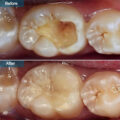What Does a Pediatric Dentist Do?
Pediatric dentists are professionals who have completed a specialized course of dentistry that caters to children who have special needs or otherwise need gentler care. The program consists of two to three years of further training after graduation from dental school. It includes hospital training, where they work with children who have more severe dental needs and emergencies, and training in numerous orthodontic teeth-straightening methods. Pediatric dentists work closely with pediatricians and general dentists, who refer select patients for this specialized dental treatment that requires this advanced training. The American Academy of Pediatric Dentistry (AAPD) is an organization of pediatric dentists, and its website has a good selection of brochures explaining their role in dentistry.
How Old Are Pediatric Dentists’ Patients?
Pediatric dentists can treat children from birth to college. If a child has unique developmental issues or needs to be seen in a hospital setting due to another medical condition, a pediatric dentist is uniquely qualified to provide that treatment. Often, children with special needs that persist into adulthood are still seen past the age of 18; their pediatric dentist knows their dental history, as well as the special treatment and procedures needed before and during treatment.
Why Choose a Pediatric Dentist Instead of a General Dentist?
All general dentists are trained in pediatric dentistry in dental school, and are predominantly taught by pediatric specialists on staff. Some general dentists are more comfortable than others in treating small children, especially if their practice serves many families and they’re familiar with common behavioral conditions that need to be addressed during treatment. But it is subjective to the practice; if a general dentist is not comfortable treating a young or special needs child, a referral is in order. You can search for one near you through the AAPD. SEE : Dental Instruments
What Benefits Do Pediatric Dentists Offer to Children?
Prevention and treatment are the primary focus areas of pediatric dentists, along with educating parents and other dental professionals on how best to treat their children. Pediatric dentists working in dental schools and hospital training facilities also conduct research to develop better methods of preventing oral health problems in children. Brochures and educational materials are plentiful online to help parents prepare for their child’s first visit to the dentist and to inform them about the preventive oral health care products available to them. SEE: How to Pick the Best Pediatric Podiatrist For Your Child
What is the difference between a dentist and a pediatric dentist?
The main difference between the two is that a pediatric dentist specializes in dentistry for children and a general dentist does not. Like orthodontists or periodontists, pediatric dentists have special training and education that make them more qualified to work with kids than other dental professionals may be.A pediatric dentist can be a helpful aid in ensuring a lifetime of healthy smiles for your children. Together, you can work toward this goal.
What does a pediatric dentist do?
Pediatric dentistry offices are colorful, fun, and child-friendly. Dental phobias are often rooted in childhood, so it is essential that the child feel comfortable, safe, and trusting of the dentist from the outset. The pediatric dentist focuses on several different forms of oral care:
Prevention: Tooth decay is the most prevalent childhood ailment. Fortunately, it is almost completely preventable. Aside from providing advice and guidance relating to home care, the pediatric dentist can apply sealants and fluoride treatments to protect tooth enamel and minimize the risk of cavities.
Early detection: Examinations, X-rays, and computer modeling allow the pediatric dentist to predict future oral problems. Examples include malocclusion (bad bite), attrition due to grinding (bruxism), and jaw irregularities. In some cases, optimal outcomes are best achieved by starting treatment early.
Treatment: Pediatric dentists offer a wide range of treatments. Aside from preventative treatments (fluoride and sealant applications), the pediatric dentist also performs pulp therapy and treats oral trauma. If primary teeth are lost too soon, space maintainers may be provided to ensure the teeth do not become misaligned.
Education: Education is a major part of any pediatric practice. Not only can the pediatric dentist help the child understand the importance of daily oral care, but parents can also get advice on toothpaste selection, diet, thumb-sucking cessation, and a wide range of related topics.
Updates: Pediatric dentists are well informed about the latest advances in the dentistry field. For example, Xylitol (a naturally occurring sugar substitute) has recently been shown to protect young teeth against cavities, tooth decay, and harmful bacteria. Children who do not see the dentist regularly may miss out on both beneficial information and information about new diagnostic procedures. SEE: Can You Have Invisalign While Pregnant
Summary
Pediatric dentistry is one of the seven recognized clinical specialties of dentistry. It includes all areas of adult dentistry that may be applied to children. However, it also includes many procedures that are specific to the peculiar needs of primary (baby) teeth and challenges of the developing child. The most significant difference between pediatric and adult dentistry is the need for dentists treating children to understand and practice sound psychological principles to allow children to have positive, relatively pain-free experiences in this important health area. Bad memories of traumatic dental therapy during childhood can infiuence children negatively and make them reject adequate dental care for life. Find an excellent pediatric or general dentist for your child. See: Piccan Teething Remedy





